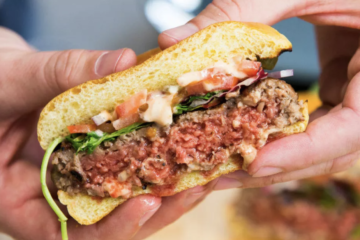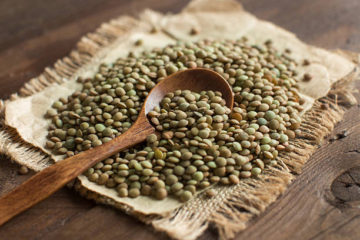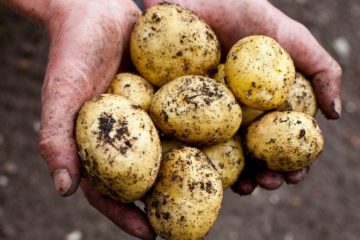Some people become vegans for ethical reasons. They won’t even eat a little bit of meat. They love the idea of saving the animals, doing their bit for the environment and jump in with both feet from Day 1.
Other people see the health benefits of a meat-free diet and also jump in with both feet.
This approach scares the vast majority of people. It scared me too – I understand that. How could I get enough protein? Would I feel tired all the time and fall in a heap? Would I still be able to maintain exercise levels? You may worry about whether you could maintain your current workload if you adopted a vegan diet.
The real question, however, in most people’s minds is – if I keep eating meat each day, and eat healthier the rest of the time, will it really make me less healthy than if I cut out meat altogether? If I cut out red meat and only eat meat and chicken, will that be a problem? Does a little bit of meat really make a difference?
This is what I want to explore in this post.
What difference do you want to see?
How strict a person needs to be with their diet depends on the nature of their illness and what it is they are trying to achieve. Dr Dean Ornish described it as being on a spectrum. The more serious the disease, the stricter you must be and for longer. That usually means eating less meat.
Most research shows that the closer a person can get to a well designed fully whole food vegan diet, the more traction they achieve in overcoming that disease.
For example, this image shows a person’s coronary artery – before and after beginning a vegan diet.

Picture A shows the dangerously narrowed artery. Just over 2 ½ years later Picture B was taken of the same artery. Dr. Caldwell Esseltyn’s documented the experiment several times in different high-level medical journals. It has been replicated hundreds and hundreds of times since. This result, however, is impossible on a less strict diet. For example, a good Mediterranean diet won’t do this. A normal vegan diet with processed food won’t do it. A diet with no added oils, nuts or seeds, and certainly no fish or chicken achieved these remarkable results. The patient continued on a cholesterol-lowering drug.
Clearly the doctor with the artery shown above had a very serious condition that could have been fatal at any moment. Serious conditions lead to serious measures thus the strict diet he was on.
Another doctor, Dr Dean Ornish had carried out a similarly successful experiment a decade earlier using a plant-based diet with a little skim milk (in coffee) and low-fat dairy in small amounts, along with moderate exercise, stopping smoking and stress management – and no cholesterol-lowering drugs. In one year, arteries were comparatively clear. This has also been replicated hundreds of times since.
This shows that broader lifestyle changes can potentially bring about more difference than diet alone, so the diet does not need to be quite so strict when you embrace wider lifestyle change.
The difference of a little bit of meat on weight loss
In 2017 a randomised controlled trial, the BROAD Study, used a plant-based diet to study cardiovascular disease, diabetes and obesity in New Zealand. At 6 months the body mass index was significantly better in the plant-based diet eaters compared to the normal diet, and the same pattern was seen at 12 months.
Many large studies have been done on weight and BMI in the largely vegetarian community at Loma Linda, California. This one <read it here> showed that the lowest BMIs overall – in fact the only BMIs averaging in the normal range were those of complete vegans. Just tipping into the overweight BMI range were vegetarians (eating eggs and dairy), then pesco-vegetarians (fish eaters), then semi-vegetarians, then non-vegetarians. This highly reliable study selected matched people groups.
Here is a direct quote from the research paper:
“Only vegan diets were associated with a BMI in the optimal range. Inclusion of meat, meat products, and fish in the diet, even on a less than weekly basis, seems to limit some of the protection associated with a vegan or lacto-ovo vegetarian diet.”
S. Tonstad, 2009
Are there any problems with fish?
I last ate fish about 2 years ago. I like to eat fish. But for reasons you can read in <this post> I don’t eat it much – as you can see.
The contamination levels with fish are a real concern and hard to avoid in any fish over the size of a sardine. It’s interesting that many parents worry about mercury in vaccines, yet if the mother ate one serve of fish a week during pregnancy, their baby will already have enough mercury to equal 6 mercury-containing vaccines. Our bodies, however, break down mercury quite fast – over several months, But we aren’t able to clear other contaminants in fish so easily, such as PBCs, dioxins and DDT metabolites.

Yes, we need Omega 3 fatty acids. But too many can lead to cognitive impairment – and this is likely to be because of the heavy metals in the fish eaten. The study above showed vegetarians who were also fish eaters were on average, overweight. So it is not a weight-loss food. Some recommend fish as an extra protein source for the elderly, but here again, we have the cognition problem with fish-eating.
What about chicken?
Despite being the favourite meat of most people, commercial chicken is a reservoir of pathogenic bacteria. Slaughter methods, packaging methods and storage all contribute to a build-up or e coli, enterococcus and viruses. Read more <here> about the studies done on organic chicken – which you think would be safe. As the prevalence of antibiotic-resistant bacteria grows, it seems eating chicken is contributing to the problem.
The problem with all commercial meat is that it harbours viruses, pathogenic bacteria and antibiotic-resistant bacteria. All but the most careful storage at the supermarket as well as at home increases risk. Growing chickens yourself is the healthiest way to eat chicken.
Where would I get my protein?
People worry about getting enough protein. Yet it is very easy to do. As long as a person gets enough food to eat overall, they will be getting enough protein. Some people have special protein needs. They are
- those over 65 (when more cells need replacement to maintain health) or
- professional level athletes or those trying to gain muscle for a sport.
Plants that are higher in protein such as beans and lentils and whole grains – with the possible addition of protein powder, can provide enough.

Breast milk is a food that enables babies to grow very fast. Yet it is less than 1% protein in weight. So why is it that we think we need a lot of protein to maintain growth?
Back in the early 1900s, it was thought the disease kwashiorkor was caused by protein deficiency. This is the disease that gives malnourished children big round tummies. Eventually, it was debunked as untrue but the myth persisted. It turned out that kwashiorkor could be reversed with a faecal transplant, meaning, giving the child a different type of gut bacteria from a healthy person. It was a gut disease, not a protein deficiency.
How much protein do you need?
We now know that 0.8 – 0.9g/kg of protein for an adult is more than adequate and that more can place excessive strain on the kidneys. For most people 0.6g/kg is sufficient for good health. Note that this is per HEALTHY kilogram.
You find out your healthy weight for age and height (not a current overweight or underweight weight) – a BMI under 24.9 – and preferably closer to 22 or 23, then multiply by 0.8 to find grams of protein needed per day.
Then you can keep track on an app like My Fitness Pal.
Foods like beans, lentils and whole grains are higher in protein than most vegetables, but every living thing contains protein and it all adds up, whatever you eat. Eating too much fish and chicken will likely push you over the limit, which can strain our kidneys <see here>, but the app will show you how much you can eat before tipping the amount needed.
Serious bodybuilders will need more protein than this.
Evidence-based nutrition
The evidence shows that the closer we get to a fully plant-based diet, the healthier we will tend to become. A well-planned plant-based diet will bring about better health most great many cases; adding animal foods does not usually add any benefit. If you choose to include fish or chicken in your diet, it is vital to recognise the potential for harm if too much is eaten, particularly in some conditions, including obesity.
On the other hand, the Ornish heart disease study showed that managing stress, exercising, being part of a caring community of friends is as important or more important than eating a pristine diet. Each person must then work out how to bring about the best balance for their own health. Different conditions benefit from lower amounts of meat; a nutritionist can show you the evidence for your particular condition.



0 Comments